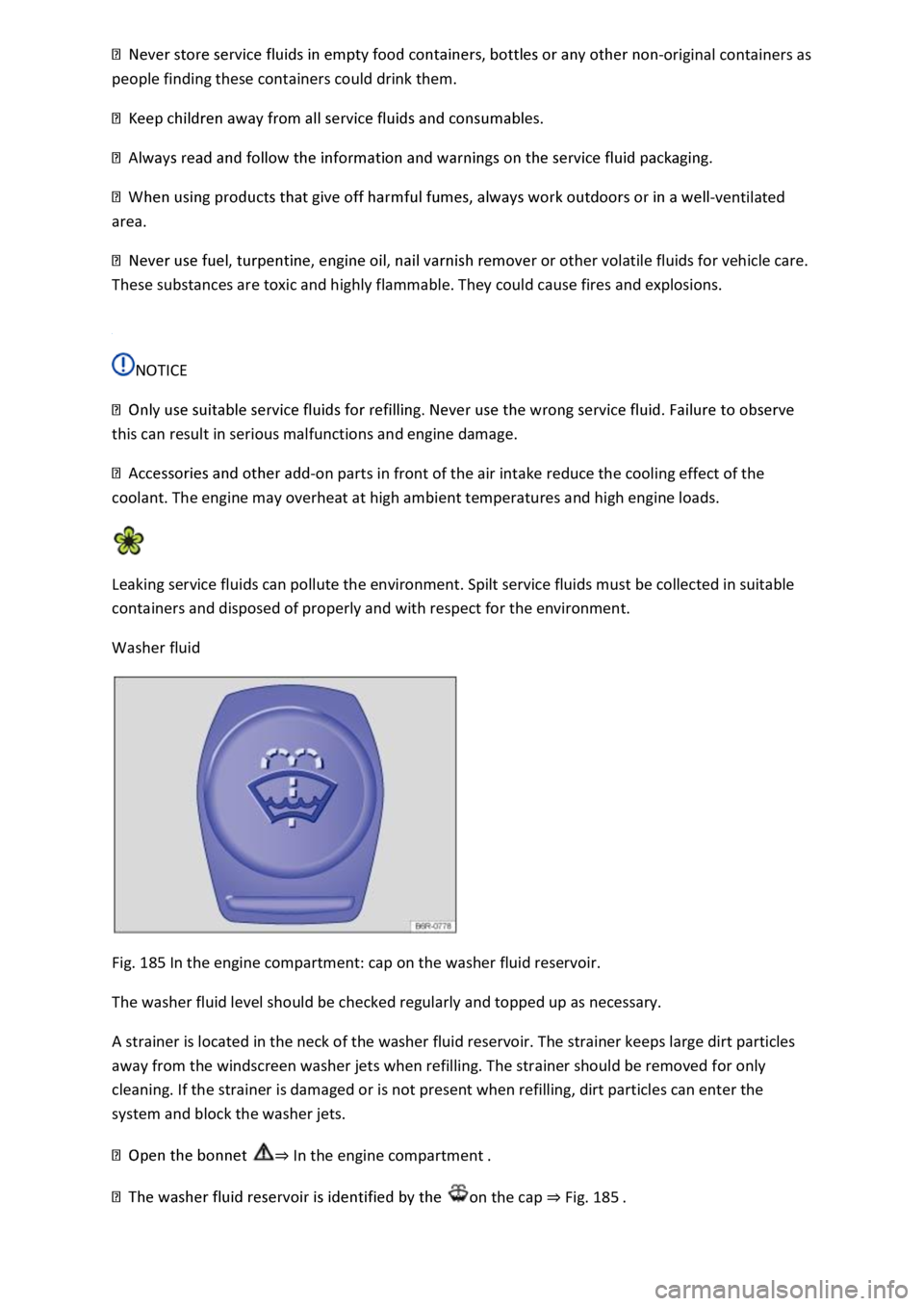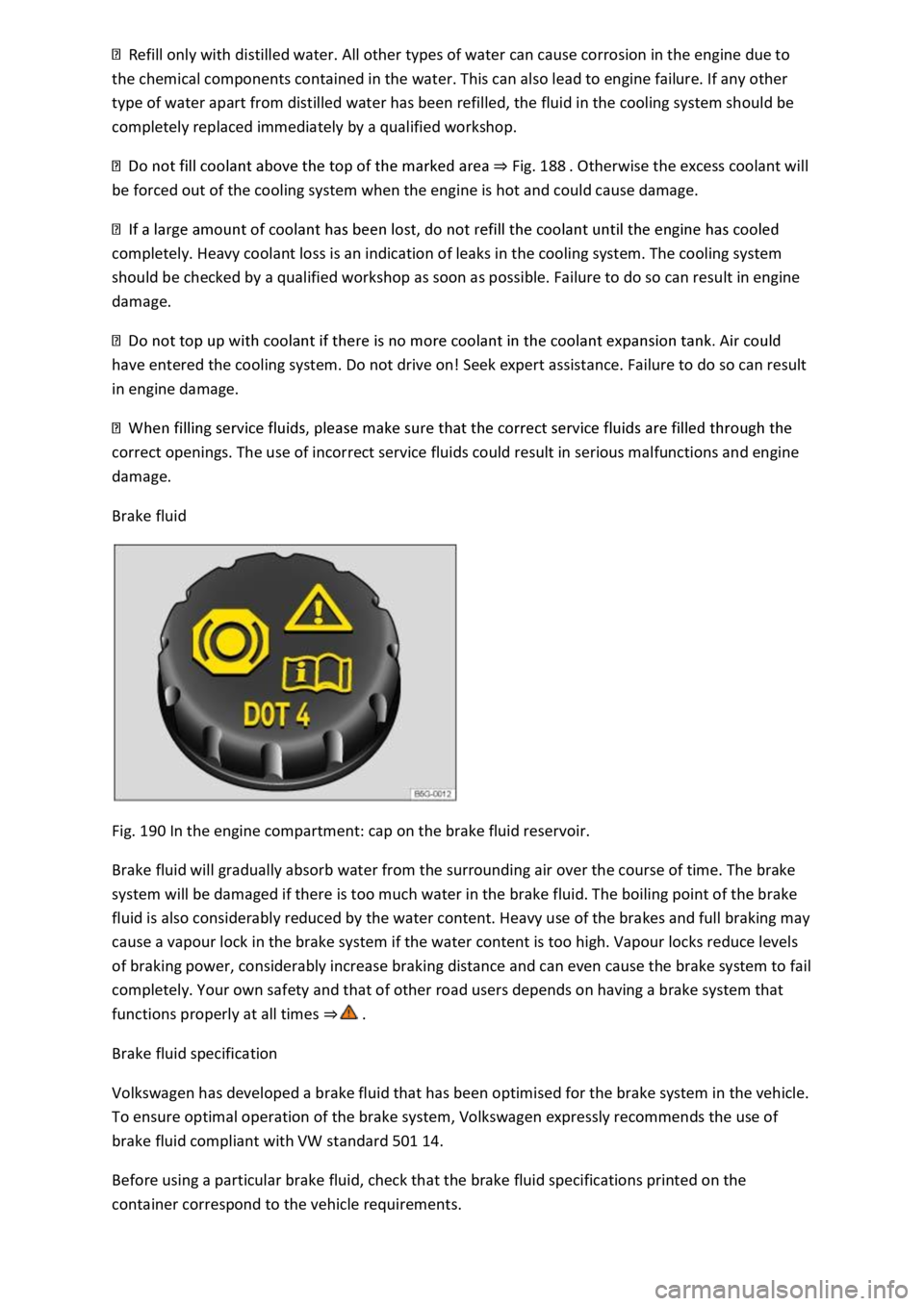Page 369 of 502

-original containers as
people finding these containers could drink them.
es.
-ventilated
area.
r or other volatile fluids for vehicle care.
These substances are toxic and highly flammable. They could cause fires and explosions.
NOTICE
this can result in serious malfunctions and engine damage.
-on parts in front of the air intake reduce the cooling effect of the
coolant. The engine may overheat at high ambient temperatures and high engine loads.
Leaking service fluids can pollute the environment. Spilt service fluids must be collected in suitable
containers and disposed of properly and with respect for the environment.
Washer fluid
Fig. 185 In the engine compartment: cap on the washer fluid reservoir.
The washer fluid level should be checked regularly and topped up as necessary.
A strainer is located in the neck of the washer fluid reservoir. The strainer keeps large dirt particles
away from the windscreen washer jets when refilling. The strainer should be removed for only
cleaning. If the strainer is damaged or is not present when refilling, dirt particles can enter the
system and block the washer jets.
⇒ In the engine compartment .
on the cap ⇒ Fig. 185 .
Page 370 of 502

⇒ . Observe the dilution instructions on the packaging.
peratures, add a special anti-freeze agent so that the fluid cannot freeze ⇒ .
The windscreen washer fluid reservoir has a capacity of about 3.0–7.5 litres, according to the vehicle
equipment.
WARNING
Never mix coolant additive or other unsuitable additives into the washer fluid. These may leave an
oily film on the screen, restricting the field of vision.
-freeze agent should be added to the washer fluid if necessary.
NOTICE
cause the ingredients to flocculate and block the washer jets.
rrect service fluids are filled through the
correct openings. The use of incorrect service fluids could result in serious malfunctions and engine
damage.
Engine oil
Introduction
This chapter contains information on the followingsubjects:
⇒ Engine oil standards
⇒ Changing engine oil
⇒ Engine oil consumption
⇒ Checking the engine oil level and refilling the engine oil
⇒ Troubleshooting
The engine oils are not only tailored to the requirements of engines and exhaust gas treatment
systems, but also to fuel quality. Due to the way in which a combustion engine works, engine oil
always comes into contact with combustion residues and fuel, which has corresponding effects on
the ageing process of the oil. The correct engine oil is important for the function and service life of
the engine. A special multigrade high-lubricity oil has been filled at the factory and this can normally
be used as an all-season oil.
Page 382 of 502

Refill only with distilled water. All other types of water can cause corrosion in the engine due to
the chemical components contained in the water. This can also lead to engine failure. If any other
type of water apart from distilled water has been refilled, the fluid in the cooling system should be
completely replaced immediately by a qualified workshop.
⇒ Fig. 188 . Otherwise the excess coolant will
be forced out of the cooling system when the engine is hot and could cause damage.
completely. Heavy coolant loss is an indication of leaks in the cooling system. The cooling system
should be checked by a qualified workshop as soon as possible. Failure to do so can result in engine
damage.
have entered the cooling system. Do not drive on! Seek expert assistance. Failure to do so can result
in engine damage.
correct openings. The use of incorrect service fluids could result in serious malfunctions and engine
damage.
Brake fluid
Fig. 190 In the engine compartment: cap on the brake fluid reservoir.
Brake fluid will gradually absorb water from the surrounding air over the course of time. The brake
system will be damaged if there is too much water in the brake fluid. The boiling point of the brake
fluid is also considerably reduced by the water content. Heavy use of the brakes and full braking may
cause a vapour lock in the brake system if the water content is too high. Vapour locks reduce levels
of braking power, considerably increase braking distance and can even cause the brake system to fail
completely. Your own safety and that of other road users depends on having a brake system that
functions properly at all times ⇒ .
Brake fluid specification
Volkswagen has developed a brake fluid that has been optimised for the brake system in the vehicle.
To ensure optimal operation of the brake system, Volkswagen expressly recommends the use of
brake fluid compliant with VW standard 501 14.
Before using a particular brake fluid, check that the brake fluid specifications printed on the
container correspond to the vehicle requirements.